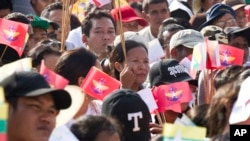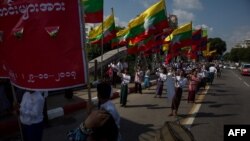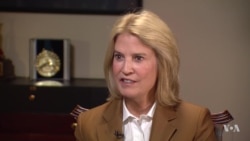Several thousand people took to the streets in Yangon on Sunday to show support for Myanmar's military, which has drawn international criticism for its crackdown on the country’s Rohingya Muslims.
A Rohingya militant attack on Myanmar police in August sparked a series of reprisals by government security forces, creating an exodus of more than 600,000 Rohingya refugees from Myanmar's northern Rakhine state into Bangladesh, mainly Cox's Bazar. Nearly 60 percent of the refugees are children.
Yet, on Sunday, demonstrators, including army supporters, Buddhist nationalists and monks, sang military songs and carried banners celebrating military leaders, media reported.
"I want to urge you to support the military. Only if the military is strengthened will our sovereignty will secured," Buddhist nationalist monk Zagara told the crowd, according to the Associated Press.
Kyaw Than, 64, a retired sergeant who served 41 years in the army, told the French news agency AFP the military "is protecting the whole country.” He said allegations that the military had committed acts of murder, rape and arson against the Rohingya were "not true."
US concerned, hold military responsible
Earlier this month, U.S. Secretary of State Rex Tillerson said he holds the military leadership in Myanmar responsible for the current refugee crisis affecting the country’s Rohingya Muslim population.
This week, Tillerson, in a phone call with Myanmar’s Armed Forces Commander-in-Chief, Senior General Min Aung Hlaing, expressed concern about the growing humanitarian crisis.
He urged Myanmar's military to facilitate humanitarian aid for people in affected areas, to allow media access, and to cooperate with the U.N. “to ensure a thorough, independent investigation into all allegations of human rights abuses and violations and to ensure accountability,” State Department spokesperson Heather Nauert said.
U.S. Senator Dick Durbin told VOA that several Republican and Democratic lawmakers met with Myanmar’s ambassador this week and told him his country’s relationship with the U.S. depends on how it responds to the crisis.
Durbin said lawmakers want authorities to allow outside observers into the conflict areas, to hold soldiers responsible for committing atrocities, and to work with the U.N. refugee agency on resettling displaced Rohingya.
“If they will not allow third party observers into the area where the worst devastation, the worst suffering is taking place, with the Rohingya people, why in the world would we want to send the first American dollar to that country?” Durbin told VOA Contributor Greta Van Susteren.
Watch the full interview:
Aid supply a challenge
On Friday, U.N. agencies said bad roads and bad weather are compounding the difficulties of delivering essential aid to hundreds of thousands of Rohingya refugees living in small, congested areas in Bangladesh.
The International Organization for Migration reported more than 800,000 Rohingya refugees are now living in Cox’s Bazar after the mass influx of the past two months. The others has arrived there after previous outbreaks of violence in Myanmar.
IOM spokesman Joel Millman said most new arrivals are living in crowded makeshift settlements. He says the heavy rains and other logistical obstacles are making it difficult to deliver the materials and relief supplies shipped to the region to the people who need it.
UNICEF spokeswoman Marixie Mercado said a nutrition survey is underway that will provide vital data when it is completed in November.
“What we already know is that the combination of malnutrition, sanitary conditions, and disease in the refugee settlements, is potentially catastrophic for children," said Mercado.
Mercado said UNICEF screened several hundred children who were stuck at the border during the mass influx in mid-October. She says dozens of children were found to be severely acutely malnourished and in need of immediate life-saving treatment.
The Rohingya Muslims say they are a long-persecuted minority in Buddhist-majority Myanmar and are often denied even the most basic human rights.
The U.N. has called the government security forces campaign against the Rohingya Muslims ethnic cleansing.
Lisa Schlein in Geneva, VOA contributor Greta Van Susteren and Capitol Hill reporter Katherine Gypson contributed to this report.









